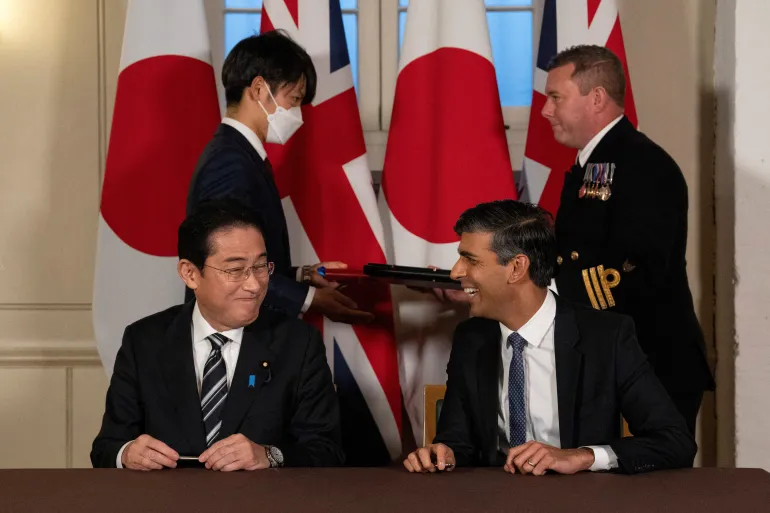Japan and the United Kingdom have signed a “hugely significant” new defence deal as Japanese Prime Minister Fumio Kishida, who recently unveiled his country’s biggest military buildup since World War II, seeks to bolster security ties with G7 partners amid worries about China’s growing power.
Kishida and the UK’s Prime Minister Rishi Sunak signed the agreement at the Tower of London on Wednesday, paving the way for the two countries to deploy forces on each other’s soil for training and other operations.
The inking of the reciprocal access defence agreement, which was agreed to in principle last May, comes a month after the two countries teamed up with Italy on a new fighter jet programme.
Japan, UK sign ‘hugely significant’ defence deal
Kishida was in London as part of a tour of the Group of Seven countries, which includes France, Italy, Canada and the United States.
Japan holds the G7 presidency and Kishida will host a summit of the group’s leaders in Hiroshima in May.
The Japan-UK deal is the latest sign of Tokyo’s efforts to strengthen its alliances in the face of challenges posed by China, which it has described as the “greatest strategic challenge ever” to its security.
The agreement also forms part of the UK’s Indo-Pacific tilt in foreign policy as it builds security and trade ties in the region. The UK has also become increasingly forceful in its approach to China, with Sunak warning in November that Beijing poses a “systemic challenge” to the country’s values and interests.
Japan, UK sign ‘hugely significant’ defence deal
Sunak’s office called Wednesday’s deal with Japan “the most significant defence agreement between the two countries in more than a century”.
“This Reciprocal Access Agreement is hugely significant for both our nations – it cements our commitment to the Indo-Pacific and underlines our joint efforts to bolster economic security,” Sunak said in a statement. “In this increasingly competitive world, it is more important than ever that democratic societies continue to stand shoulder to shoulder as we navigate the unprecedented global challenges of our time.”
It has also recently overhauled its defence and security policy, also to address what it calls growing pressure from China. These include plans to increase its defence spending to two percent of gross domestic product by 2027, up from the traditional one percent level. That would make Tokyo’s defence budget the world’s third-largest.
Euan Graham, a senior fellow at the International Institute for Strategic Studies, described Wednesday’s British-Japanese deal as “quite a significant step up for both countries in terms of their bilateral defence relationship”.
UK ships and aircraft can visit Japan and vice-versa but the process is “diplomatically complicated” and requires foreign ministry clearance each time, he told the AFP news agency. The new agreement will create a “standing framework” instead, making it easier to “bring a destroyer to visit Yokosuka, or to bring in an army group, or to bring in some Royal Marines who want to train with the Japanese amphibious forces,” he said.
China, meanwhile, criticised the move, with foreign ministry spokesperson Wang Wenbin saying the Asia Pacific region was “not an arena for geopolitical games”. He told a briefing in Beijing that China was a partner for cooperation and “not a challenge”.
“The old thinking of bloc confrontation should not be introduced into the Asia-Pacific region,” he adde.




